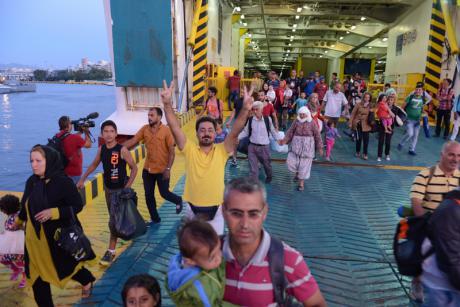Dealing with the refugee crisis has become part of the Greek political parties’ agenda due to the forthcoming elections on September 20.
By Maria Alvanou
Greeks know well the pain of refugeehood, due to the country’s geographical position and several historical tragedies. The word “prosfygas” (refugee) characterizes the identity of many individuals, families, neighborhoods, even cities. It bears the collective and historical memory of bitter stories narrated by grandmothers and grandfathers about how they faced danger, torment, travelling in inhuman conditions and also how some suffered racism, prejudice, hate speech, even violence in their new life in the Greek Motherland. Overcoming all, they managed to prosper and become among the most precious cultural elements of Greece.
This historical experience may explain how during the current mainly Syrian refugee crisis many Greeks show touching solidarity with private or NGO initiatives. On the other hand, violent attacks have taken place against refugees and the rhetoric of fear and even hate has found its place in public debates.
The way a state addresses this issue reveals its approach to the value and dignity of human beings. Dealing with the refugee crisis has become part of the Greek political parties’ agenda due to the forthcoming elections on September 20. Greece like any other country has to consider practical legal and criminological points regarding the passage and final destination for refugees:
- Legislation and prevention measures to combat refugee trafficking: This is the most critical and difficult issue, and depends on a country’s policy orientation. Do these measures aim just at stopping the influx of refugees, even at the cost of human lives? Or is it to help save refugees’ lives and find security, yet punish those who exploit them and treat them with less respect and care than they would suitcases at airport facilities? The first scenario means excessive measures of border security. This will probably not eradicate the problem, because refugees will risk anything to overcome obstacles. Moreover such measures make a good excuse for high trafficking prices (making it a very lucrative business) and turn the trip into a dangerous one for the refugees’ lives and safety.
The second scenario fights against the inhuman economic exploitation and treatment of refugees. Laws and measures should target and punish human traders for risking people’s lives and treating them like objects, not punish refugees for trying to survive.
- Addressing crime: Refugees need protection. This does not mean that every single refugee will never commit a criminal or violent act in the new country. Possible social isolation and segregation, lack of opportunities, cultural conflict and other grievances and reasons could result in various forms of deviant behavior. In addition, special attention should be given regarding terrorism, as jihadists may conceal themselves among the waves of refugees. Measures must be taken to address the above problems, like good integration and equal opportunities policies, cooperation and exchange of information between the several national law-enforcement agencies.
But crime should be seen from the other side as well: crime against refugees. Addressing hate and racist crime and violence must become a priority, including quick law-enforcement response, effective legislation, the education of society according to the principles of solidarity, tolerance and acceptance regardless of skin colour, gender, religion, origin, sexual orientation and practices.
- Effective implementation of asylum legislation: Apart from good, fair and effective legal provisions for refugees, the state must also apply them effectively, meaning: highly trained personnel to correctly process and evaluate applications, treating refugees under humane conditions in accommodation facilities that do not threaten their dignity, where there is access to healthcare.
Of course none of the above really solves the true problem, which is preventing refugeehood. Legal and criminological measures cannot correct conflicts, crisis or the international policies of states that are responsible for destabilizing other countries and allowing conditions that lead fellow human beings to abandon their homes and trust their lives and hopes to a rickety boat sailing the Aegean sea. Yet, such measures are necessary to address the emergencies already caused.
Apart from states, everyday people, wherever in the world, can show humane solidarity to refugees. A good example is the initiative “People’s Armada”, a crowdfunding campaign supporting ships that locate and rescue refugees in danger. Helping rescue boats exist and function means more rescues, more alive people. Campaigns like this, saving the lives of refugees, are a prerequisite for all other national and international efforts to deal with the refugee crisis.
Time is critical and help can’t wait. Men, women and children could be in danger right now. It is time for states and individuals to assume responsibility globally. Dealing with the refugee crisis is a matter of human civilization, a sign of humanity.
This article is written in support of People’s Armada, a crowdfunding campaign to raise $3,000,000 in 10 days to buy Migrant Offshore Aid Station (MOAS) another search and rescue boat. Our initial target is enough for MOAS to buy and refit one ship, but ultimately we aim to raise enough to send an armada of crowdfunded ships to save thousands of lives. All money raised goes directly to MOAS. Please join us here: www.peoplesarmada.com









